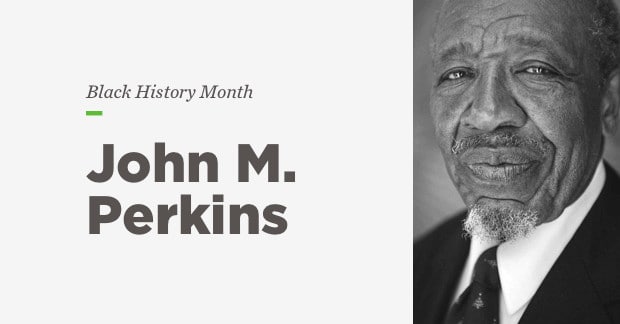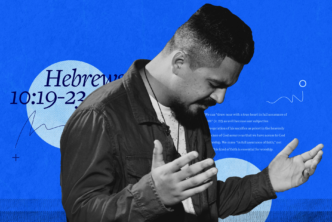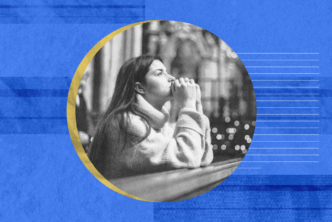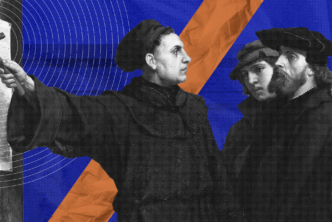Dr. John M. Perkins is one of the last living figures of the Civil Rights Movement.
Born into poverty as the son of a sharecropper, Dr. Perkins grew up on a Mississippi plantation under extreme racism. He lost his teenage brother to murder, was beaten multiple times, and was imprisoned. He was harassed continually—not to mention experiencing the countless traumas of segregation and oppression in the American South. The death of his brother, Clyde, affected Perkins deeply, and at age 17 he moved to California to escape oppression.
In 1957, John became a Christian, and this was the catalyst that changed the course of his life. He moved with his family from California back to his hometown to share the gospel. Dr. Perkins grew to become one of the leading evangelical voices in the Civil Rights Movement. His message is centered on reconciliation and loving the impoverished at a grassroots level.
John and his family have ministered to the poor for over 40 years. He has written and coauthored more than a dozen books, including One Blood: Parting Words to the Church on Race (2018), A Quiet Revolution, Let Justice Roll Down, Beyond Charity, He’s My Brother, and A Time to Heal.1
In 2004, Perkins partnered with Seattle Pacific University to launch the campus-based John Perkins Center for Reconciliation, Leadership Training, and Community Development. The Center is a first-of-its-kind partnership, and what Perkins describes as “the fulfillment of a lifelong dream.”
In the following excerpt from his autobiography Let Justice Roll Down, Perkins recounts God moving deeply in his heart while recovering from injuries and ulcers that were sustained from injuries during civil rights movements.
***
God was showing me something, telling me something. There were blacks who had accepted our message. Who had embraced the gospel. Who now knew dignity. Who now walked taller than before.
And there were whites who believed in justice. Who lived love. Who shared themselves. Who joined our community.
I began to see with horror how hate could destroy me—destroy me more devastatingly and suddenly than any destruction I could bring on those who had wronged me. I could try and fight back, as many of my brothers had done. But if I did, how would I be different from the whites who hate?
And where would hating get me? Anyone can hate. This whole business of hating and hating back. It’s what keeps the vicious circle of racism going.
The Spirit of God worked on me as I lay in that bed. An image formed in my mind. The image of the cross—Christ on the cross. It blotted out everything else in my mind.
This Jesus knew what I had suffered. He understood. And he cared. Because he had experienced it all himself.
This Jesus, this One who had brought good news directly from God in heaven, had lived what he preached. Yet he was arrested and falsely accused. Like me, he went through an unjust trial. He also faced a lynch mob and got beaten. But even more than that, he was nailed to rough wooden planks and killed. Killed like a common criminal.
At the crucial moment, it seemed to Jesus that even God himself had deserted him. The suffering was so great, he cried out in agony. He was dying.
But when he looked at that mob that had lynched him, he didn’t hate them. He loved them. He forgave them. And He prayed [to] God to forgive them. “Father, forgive these people, for they don’t know what they are doing.”
His enemies hated. But Jesus forgave. I couldn’t get away from that.
The Spirit of God kept working on me and in me until I could say with Jesus, “I forgive them, too.” I promised him that I would “return good for evil,” not evil for evil. And he gave me the love I knew I would need to fulfill his command to me of “love your enemy.”
Because of Christ, God himself met me and healed my heart and mind with his love. I knew then what Paul meant when he wrote:
Who shall separate us from the love of Christ? shall tribulation, or distress, or persecution, or famine, or nakedness, or peril, or sword? Nay, in all these things we are more than conquerors through him that loved us. For I am persuaded, that neither death, nor life, nor angels, nor principalities, nor powers, nor things present, nor things to come, nor height, nor depth, nor any other creature, shall be able to separate us from the love of God, which is in Christ Jesus our Lord. (Romans 8:35, 37–39)
The Spirit of God helped me to really believe what I had so often professed, that only in the love of Christ is there any hope for me, or for those I had once worked so hard for. After that, God gave me the strength and motivation to rise up out of my bed and return to Mendenhall and spread a little more of his love around.
Oh, I know man is bad—depraved. There’s something built into him that makes him want to be superior. If the black man had the advantage, he’d be just as bad, just as bad. So I can’t hate the white man.
The problem is spiritual: black or white, we all need to be born again.
It’s a profound, mysterious truth—Jesus’ concept of love overpowering hate. I may not see its victory in my lifetime. But I know it’s true.
I know it’s true because it happened to me. On that bed, full of bruises and stitches—God made it true in me. He washed my hatred away and replaced it with a love for the white man in rural Mississippi.
I felt strong again. Stronger than ever. What doesn’t destroy me makes me stronger.
I know it’s true.
Because it happened to me.





